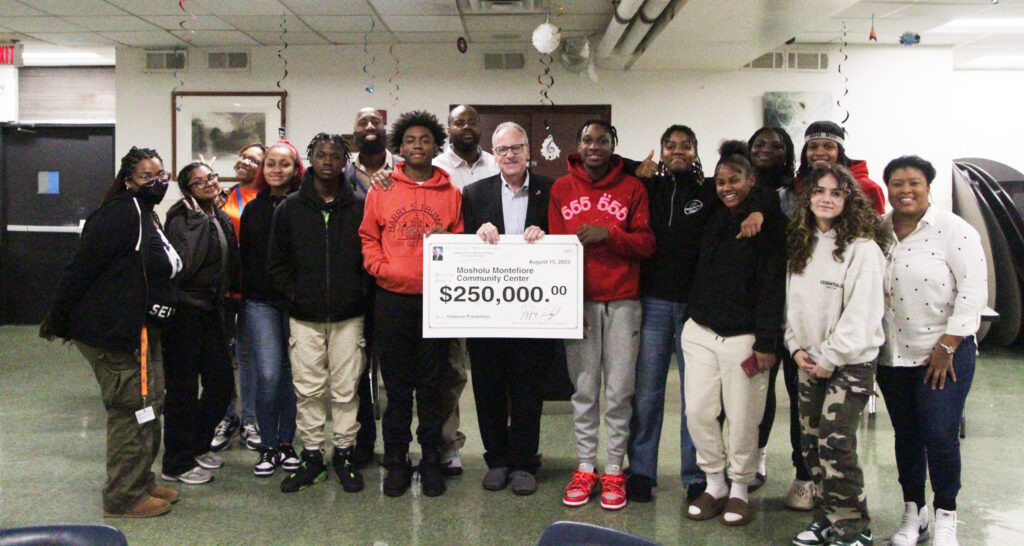
Photo by Síle Moloney
Assemblyman Jeffrey Dinowitz (A.D. 81) presented a check for $250,000 to Mosholu Montefiore Community Center (MMCC) on Monday, Nov. 6, to support its restorative justice program at the Norwood-based center (MMCC), in the presence of some of the young course participants and course facilitators. Dinowitz said the funding will help support “anti-gun, anti-drug, anti-violence, and anti-gang programs for teens.”
Addressing those gathered, the assemblyman said, in part, “I’ve been coming here for a very long time… really… since I was your age. I’m not kidding, and that was a while back, and this organization has grown over the years.” He said though he had been familiar with the center when he was first elected to office, he was given a tour of the building at the time.
“This center had more than I ever dreamed of,” Dinowitz said, adding that it was also used as a polling site during elections. “They took me down two levels where there’s a basement and there’s a sub-basement. So, the gym is in the sub-basement and then up on each level and then we got to the top floor, they say, ‘Oh we’re not finished!’”
The assemblyman explained how there were more facilities on the roof, including a playground. “For teenagers, for younger kids, even little kids, senior citizens, really it has something for everybody and one of the things I get a lot of pleasure out of doing is helping in my way to get some money to the center,” he said, adding that he also worked with other elected officials on such funding.
Explaining briefly how government worked and addressing the youth directly, he said, “The center wouldn’t be able to operate without funding because the people who are in charge of it, the people who will work to make sure the programs run, they got to get paid! You know, there might be some volunteers here, but most people have to get paid.”
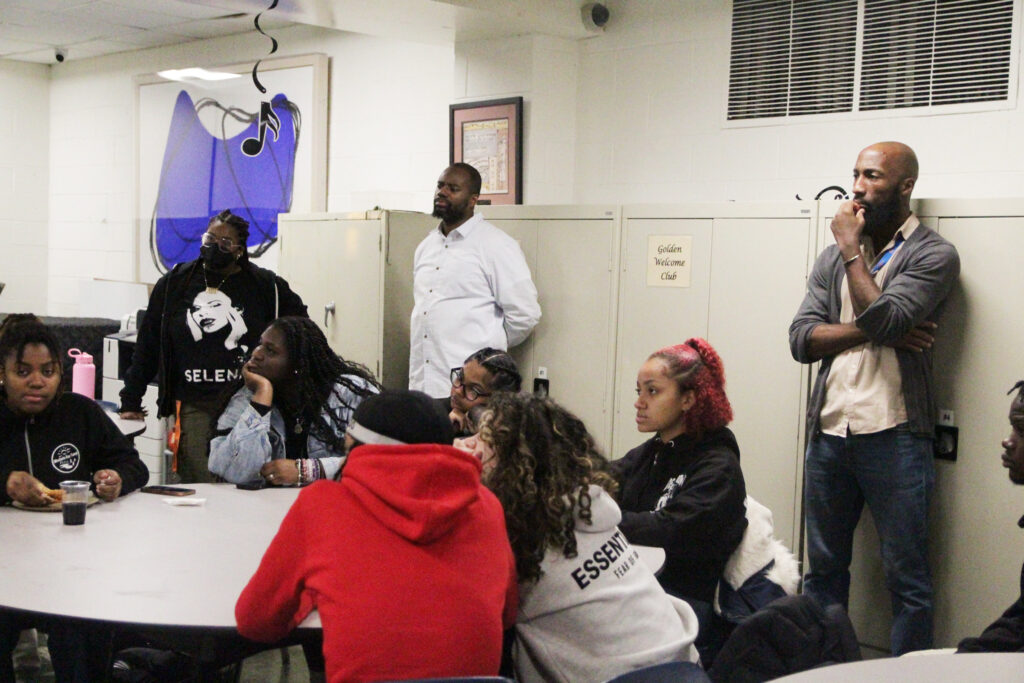
Photo by Síle Moloney
Dinowitz later said, “We want our teens to have opportunities and positive activities in the community, and MMCC provides that. This center serves 35,000 Bronxites yearly. Thank you to the MMCC staff and MMCC teens for being such excellent tour guides and hosts!”
Norwood News later spoke to Drego Moore Jr., one of the facilitators of the program, which runs in the evenings from 6 to 9 p.m. ‘The kids are coming in from the after-school programs, sports teams, and they’ll come in and we’ll have food for them: sandwiches, pizza,” he said. “So, that first 30 minutes, a lot of them may not have eaten since lunch in school, so the goal is to give them a bit of nourishment.”
Moore Jr. said after that they cover different topics. For the last week or two, he said they had been discussing about what a debate is, and what are the pillars of what makes a healthy debate. “The goal is to have them be able to have discussions and discourse around any topic that they can be going through as young people, but it should be healthy, right?” he said.
Moore Jr. added, “And so, we’ve adopted some of the tenets of the natural debate team, and so they get to persuade the audience, if you will, on the affirmative side or the negative side of their topic. So, they also learn that they do not have to agree on everything. So, we make them pick sides that they may not agree on.”
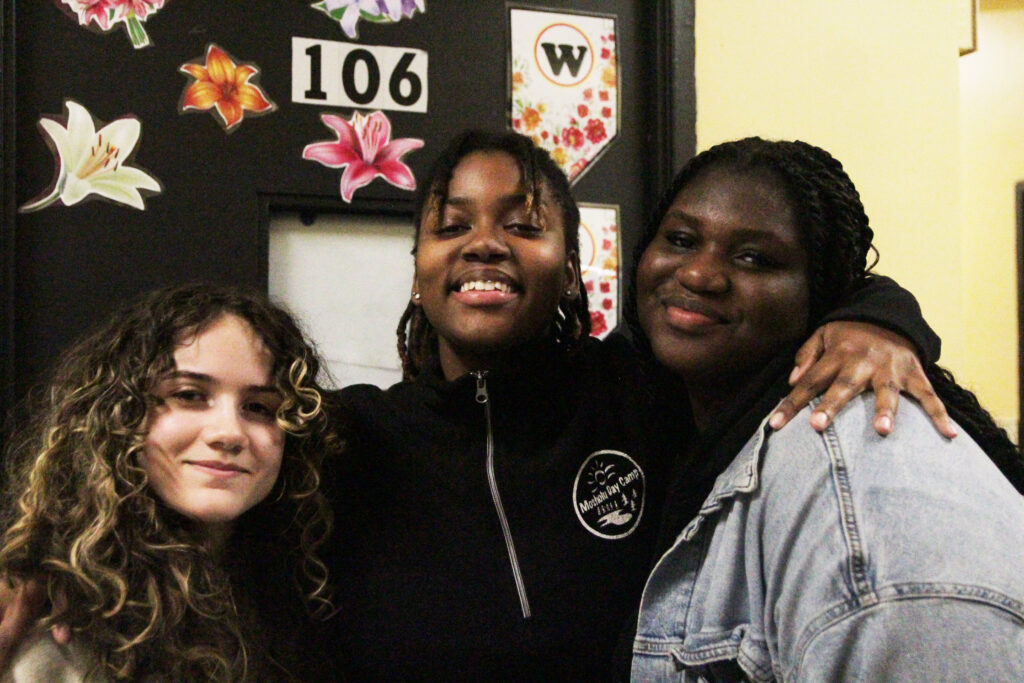
Photo by Síle Moloney
Moore Jr. said the topics can be simple or complex. The debate on Nov. 6 was, “Is marijuana legal?” He continued, “So, we all know that obviously 18 and up is kind of the thinking. Some people say 21, but working in the high schools, I was able to see a lot of kids…16, 17, sometimes even 14, 15, already experimenting, and worse, right? It’s a part of their routine and so where do you meet them at? Do you say, ‘Hey, don’t do it,’ but they’re doing it before school, after school, some even during school, locker rooms, stairwells?”
He asked, “Do you arm them with enough information to make good decisions on how they’re using it or is it just a harsh ‘no,’ knowing that, as an adult, if I say no, they just won’t do it in front of me, but then they’ll go do it with their friends and subject themselves to some other type of harmful chemicals.
Moore Jr. said the program is partly about mentorship. Other topics covered have been on prison reform and the age of consent. “Just topics that their parents may not have a conversation with them about…what is the age of consent?” he said. Moore Jr. continued, “What does the State say? You know, some people feel because they’re in the same school…if I’m 17, and this person is 15…well, we’re in the same school….and that’s not the case. That’s not how the law works, right? So, 16 and 17……a 16-year-old is not at a legal age of consent, right? 17 is, right? We don’t sugarcoat.”
He said they also invite different speakers to the center to share their insights, ranging from judges to law enforcement, and from gang members to people who have spent 30+ years in the prison system.
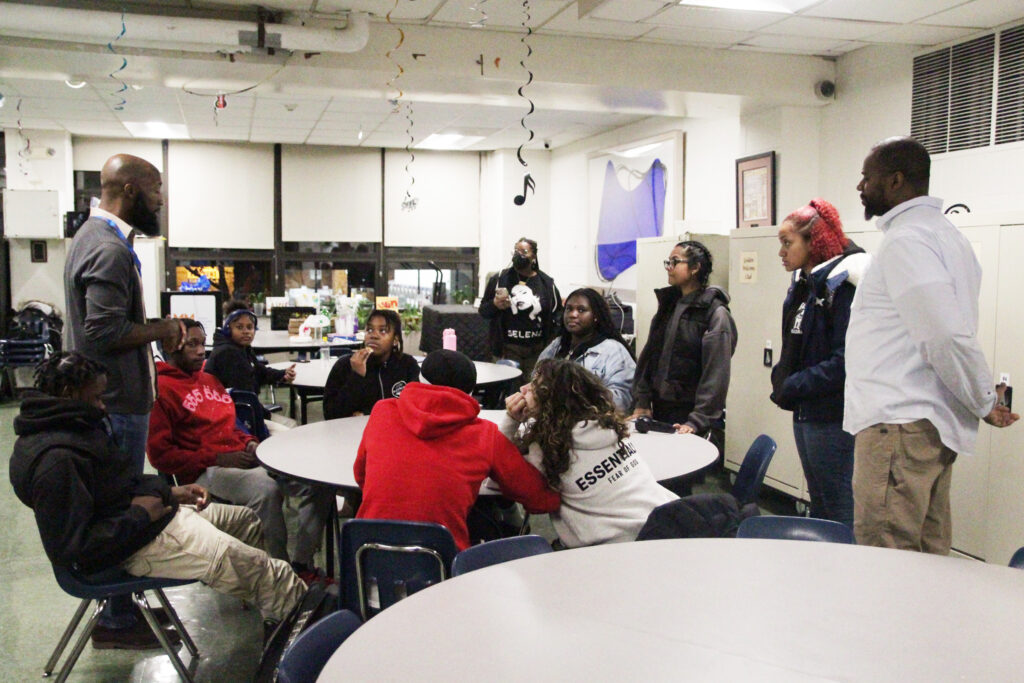
Photo by Síle Moloney
Moore Jr. said they also talk about strengthening the family. “How do we take young people who may be subjected to certain ails of the neighborhood and really arm them with ways to navigate the environment, because we can’t necessarily pull them out of their home, or out of their environment,” he said. “But we can kind of give them some tools to help them move forward in a way that’s beneficial to them, and their families, and the community at large.”
He said a core aim is to give the participants ways to interact with their family members to have more peaceful environments in the home, and at school with teachers. “So, that’s kind of why I love it because I think it empowers them,” he said.
We spoke to three young female participants of the program, Michal Steadman, 17, Angela Marie, 16, and Shiloh Ackon, 16. Asked how long she’d been coming to the program, Michal said about a year. She said she heard about it from her basketball coach. “He brought us here and we played basketball and also in this restorative justice program,” she said.
Asked if she felt the program was important and why, Michal said, “Because in our society today, a lot of our young people are going through hardships and just struggle with identity, and I feel like it’s helpful to come to these types of programs and see why it’s good to be on the right track, and be around the right people, and just limit being at the wrong place at the wrong time.”
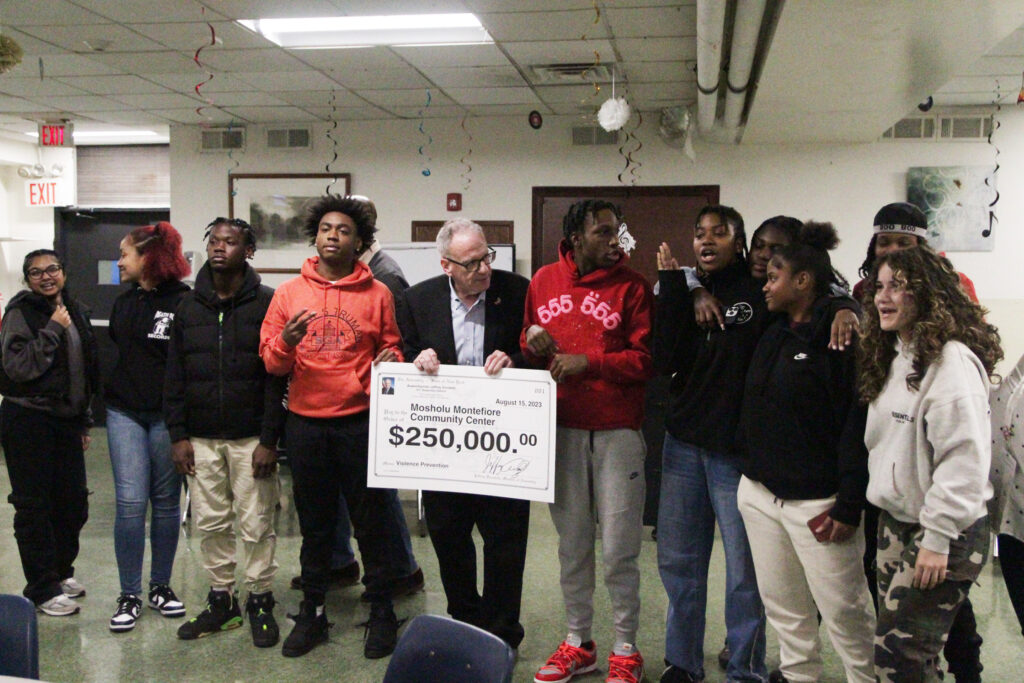
Photo by Síle Moloney
Michal referenced the talks by visitors to the group, including those who had been in penitentiaries and in confinement. “I feel like real life scenarios and people who have been through the things that they’re talking about, coming, is helpful for us to really get a feel of what we don’t want to be,” she said.
We asked Angela what she liked about the program. “I started coming around a year ago and I feel like it gave me a purpose,” she said. ‘I feel like I have something to do after school, and I’m not just sitting around at home, and I feel like I’m doing something with my life, and I’m on the right track, around the right people that can guide me to do the right things,” she said.
Asked if it had changed her mindset on the topic of restorative justice, she said, “Yes, I feel like I’m more enlightened, and I feel like I’m up to date on everything.” Asked if she had any other thoughts about the program, Angela added, “People be tellin’ you, ‘Oh, stay off the streets!’ They don’t dictate to you. I feel like this place kind of shows you instead of telling you, and more people are bound to listen that way.”
Asked for her thoughts on the program, Shiloh said, “I feel like it’s a good place for kids to come and like stay out of trouble, and it can be helpful because a lot of kids don’t have an outlet or a place to go.” She added, “So they’re not on the street doing stuff that they’re not supposed to do, and that gives them a place to like do their homework, chill with their friends…like, really just be.”
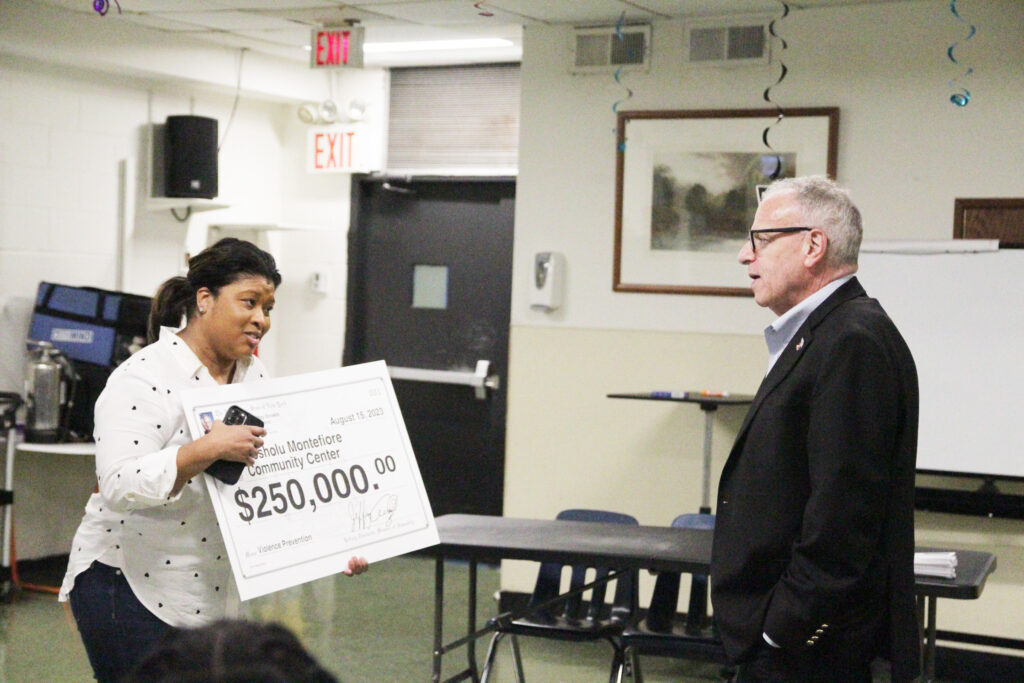
Photo by Síle Moloney
Asked how she heard about the program, Shiloh said through her best friend, Angela. “I’ve been coming here for almost a year,” she said. Asked if she felt society’s perception of restorative justice had changed in recent years, she said, “I wouldn’t say, per se, shifted, but I think that people know more about the topics that we learn about here, and they’re more aware of the stuff that goes on in our community. So, they’re not just like walking around the place they live. They actually, like, know what’s going on, and the stuff around them and the people around them.”
The three young women agreed the instructors were fantastic and “great people.” Asked what they would say to anyone interested in joining the program, one of the three said, “I would say to definitely speak to the directors of the program. So, that could be to Nikko, or it could also be Drego, and just ask about everything that we do here, and see if it’s the right fit for you. I definitely believe that we’re doing something good here.”
To read our previous coverage on MMCC’s work, click here, here and here.




